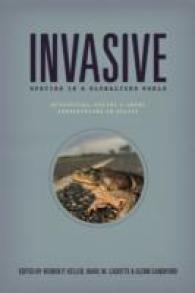Full Description
This book describes an innovative, evidence-based method for preparing students for the demands of college writing called Supporting Strategic Writers (SSW). The goal of SSW is to help students become independent learners who understand the value of strategies and can apply them flexibly in future courses and the workplace. The text provides genre-based strategies for rhetorical analysis, planning, evaluation and revision, critical reading of sources, and synthesis of sources that are part of college composition and applicable across contexts and course assignments. Equally important to the SSW approach is that students learn metacognitive strategies for goal setting, task management, progress monitoring, and reflection. Instructional methods include discussion of model essays, think-aloud modeling of strategies, collaborative writing, peer review and self-evaluation, and reflective journaling.
Book Features:
Integrates three critical components: strategies for critical reading and writing, metacognitive strategies to help students take control of their learning, and pedagogical strategies.
Provides research-based approaches for teaching developmental writing courses, first-year composition, summer bridge programs, and first-year seminars.
Offers thorough explanations of the strategies and instructional methods, with practical examples and support materials for instructors.
Based on two years of design research and three experimental studies which found significant positive effects on writing quality and motivation with college students in developmental writing courses.
Contents
Contents (Tentative)
Foreword
Preface
Development of the Supporting Strategic Writers Program
Organization of Our Book
ConclusionPart I. Introduction to Supporting Strategic Writers
1. Addressing Challenges in Postsecondary Education: The Genesis of SSW and Research Findings
Developmental Writing
College Expectations
Supporting Strategic Writers Project
Research on Supporting Strategic Writers
Conclusion
2. Core Instructional Components of Supporting Strategic Writers
Core Principles of Strategy Instruction
Writing Strategies
Metacognition and Motivation
Pedagogical Methods
ConclusionPart II. SSW Writing Strategies
3. Planning and Drafting for Argumentative Writing Without Sources
Collaborative Practice
Guided Practice
Conclusion
4. Evaluating and Revising for Argumentative Writing Without Sources
Strategies for Evaluation and Revision
Introduction to a New Genre
Preparation for Peer Review
Peer Review and Revision
Reflection
Conclusion
5. Challenges of Writing Using Sources; Summary-Response
SSW Strategies for Writing Using Sources
Instruction Following the Strategy for Teaching Strategies
Connecting Summary-Response to Writing Essays With Sources
Conclusion6. Integrating Ideas From Sources in an Essay
Sequence of Assignments
Introduction to Writing Using Sources
Integrate Ideas From Sources With Your Own Ideas
Plan Your Essay
Draft the Essay
Further Assignments
Selecting SourcesConclusion
Part III
A Look to the Future
7. Addressing Challenges in Implementation and Problem-Solving
Challenges With the Use of Cognitive Strategies
Institutional Organizational Structures
End of Semester Reflection
Conclusion
8. Extending the Strategies to Other Genres and Other Courses
Adapting Strategies to Genres Across Courses
Examples of Applying the SSW Strategies in Other Courses
Concluding Thoughts
References
Index
About the Authors







